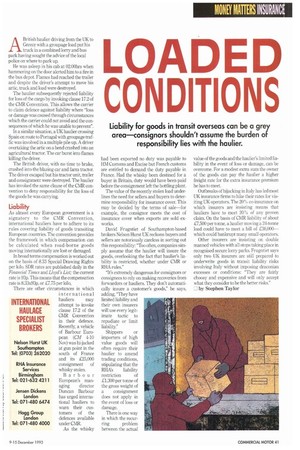LOADED CONDITIONS
Page 49

If you've noticed an error in this article please click here to report it so we can fix it.
Liability for goods in transit overseas can be a grey area—consignors shouldn't assume the burden of responsibility lies with the haulier.
ABritish haulier driving from the UK to Greece with a groupage load put his truck in a combined lorry and bus park having sought the advice of the local police on where to park up.
He was asleep in his cab at 02.00hrs when hammering on the door alerted him to a fire in the bus depot. Flames had reached the trailer and despite the driver's attempt to move his artic, truck and load were destroyed.
The haulier subsequently rejected liability for loss of the cargo by invoking clause 172 of the CIVIR Convention. This allows the carrier to claim defence against liability where "loss or damage was caused through circumstances which the carrier could not avoid and the consequences of which he was unable to prevent".
In a similar situation, a UK haulier crossing Spain en route to Portugal with groupage traffic was involved in a multiple pile-up. A driver overtaking the artic on a bend crashed into an agricultural tractor. The car burst into flames killing the driver.
The British driver, with no time to brake, crashed into the blazing car and farm tractor. The driver escaped but his tractor unit, trailer and consignment were destroyed. The haulier has invoked the same clause of the CMR convention to deny responsibility for the loss of the goods he was carrying.
Liability
As almost every European government is a signatory to the CMR Convention, international hauliers have to adhere to its rules covering liability of goods transiting European countries. The convention provides the framework in which compensation can be calculated when road-borne goods moving internationally are lost or damaged.
In broad terms compensation is worked out on the basis of 8.33 Special Drawing Rights per kilo. SDR rates are published daily in the Financial Times and Lloyd's T it the current rate is 93p. This means that the compensation rate is 8.33x93p, or £7.75 per kilo,
There are other circumstances in which international had been exported no duty was payable to HM Customs and Excise but French customs are entitled to demand the duty payable in France. Had the whisky been destined for a buyer in Britain, duty would have been paid before the consignment left the bottling plant.
The value of the recently stolen load underlines the need for sellers and buyers to determine responsibility for insurance cover. This may be decided by the terms of sale—for example, the consignor meets the cost of insurance cover when exports are sold exworks.
David Frugntiet of Southampton-based brokers Nelson Hurst UK reckons buyers and sellers are notoriously careless in sorting out this responsibility: "Too often, companies simply assume that the haulier will insure the goods, overlooking the fact that haulier's liability is restricted, whether under CMR or RHA rules."
"It's extremely dangerous for consignors or consignees to rely on making recoveries from forwarders or hauliers. They don't automatically insure a customer's goods," he says, adding, "They have limited liability and their own insurers will use every legitimate tactic to repudiate or limit liability."
Shippers or importers of high value goods will often require their haulier to amend trading conditions, stipulating that the RHAs liability restriction of £1,300 per tonne of the gross weight of a consignment does not apply in the event of loss or damage.
There is one way in which the recur ring problem between the actual value of the goods and the haulier's limited liability in the event of loss or damage, can be overcome. For a modest extra sum the owner of the goods can pay the haulier a higher freight rate for the extra insurance premium he has to meet.
Outbreaks of hijacking in Italy has led most UK insurance firms to hike their rates for visiting UK operators. The 20% co-insurance on which insurers are insisting means that hauliers have to meet 20% of any proven claim. On the basis of CMR liability of about £7,500 per tonne, a haulier moving a 24-tonne load could have to meet a bill of £36,000— which could bankrupt many small operators.
Other insurers are insisting on double manned vehicles with all stops taking place in recognised secure lorry parks. Frugntiet says only two UK insurers are still prepared to underwrite goods in transit liability risks involving Italy without imposing draconian excesses or conditions: "They are fairly choosy and expensive and will only accept what they consider to be the better risks."
by Stephen Taylor


























































































